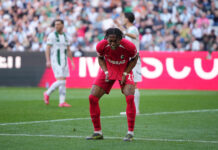There’s a new norm in football—and it’s not related to data analysis or biohacking the body. European association football has shown a clear tendency to overbook its teams in domestic and international leagues, as well as international football.
There may be more for fans to chew on, but there’s increasing concern that athletes and staff may not be able to keep up with the demand. And even if coaches can rally their players into game after game with only a day or two’s rest in between, there’s an even better question—won’t that change the beautiful game, and certainly for the worse?
Already, fixture congestion has changed how athletes perform and how coaches structure their squad. There’s a stronger emphasis on health and injury prevention, as well as a new wish list when scouting to build a roster.
For many coaches and staff, the focal concern behind adding depth to a roster is to relieve players who are burnt out from stretches of congested games. However, as proof mounts that too many games lead to long-term effects on fitness and performance, coaches like Mourinho and Klopp are looking for solutions to the demands placed on their players.
With the short-lived push for the ESL now passed, both coaches have seemingly dodged an even denser workload. But that doesn’t mean they’re happy with fixture congestion; in 2018, Klopp spoke out against the proposed Nations League, while Mourinho made headlines last year by calling Tottenham Hotspur’s opening schedule “a joke”.
Revolutionizing a Player’s Outlook
Fixture congestion has shifted the focus of the game. It’s not just about defeating another team but about delivering more entertainment to fans, which drives up revenue for clubs. Though most fans would rather see fewer high-quality games, it seems football has gone the way of quantity.
This changes football in a few crucial ways. First, players are more keenly aware of their energy expenditure. They will selectively decide which plays are worth their effort, especially when they’ve got a week of games ahead of them. Fans aren’t seeing players at their most creative and dynamic but at their most conservative.
Additionally, endurance has become the name of the game. Sure, fitness has always been pivotal to a sport as aerobic as football, but now a player might shy from a quick burst of energy if they know they’ll have limited recovery time.

Slowly Restructuring
Coaches and managers, just like players, are looking to mitigate the chances of burnout and injury wherever possible—while also trying to outperform rivals. But the going is tough; just look at Leicester City’s current injury crisis or the number of minutes Arsenal’s budding star Bukayo Saka has put in during the last year.
There are three main priorities for association coaches right now: optimising a player’s time on the field by rotating them into new positions or sitting them, alter the goals of training sessions, and recruiting robust players that can play on the field.
First and foremost, most Premier League players aren’t going to be competing for the standard 75 to 90 minutes in midweek games. If they are, coaches are often rotating them into alternate positions where it’s less likely they’ll develop soft-tissue injuries from overexertion.
These concerns are particularly relevant for strikers and midfielders, who bear the brunt of fast breaks and are responsible for scoring crucial goals. Additionally, trainers are altering how and when players train. There’s more emphasis placed on warming up and cooling down—particularly on stretching.
Sleeping and eating have also become even more important. Some clubs employ sleep coaches to help players beat jetlag and optimize their rest schedules. Nutritionists aren’t new to the scene, but they’ve begun to push more carbs for players with the highest demands.
Lastly, coaches are seeking out more robust athletes to add to their roster. In addition to searching out talent and forecasting future worth, scouts now need to find players that can perform in multiple positions in order to offer relief to as many key players as possible. The Euro 2020 and the World Cup next year will only add to the burden of teams looking to tick things smoothly.




